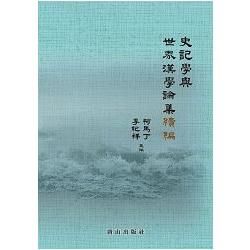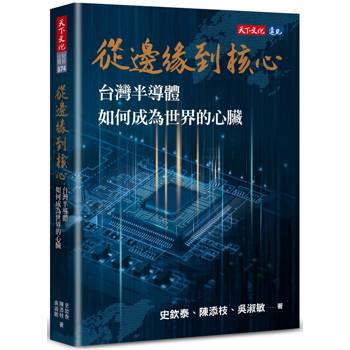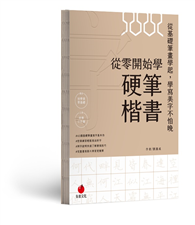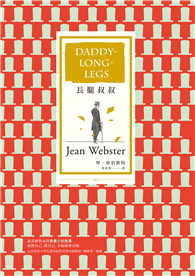| FindBook |
有 4 項符合
史記學與世界漢學論集續編的圖書 |
 |
史記學與世界漢學論集續編 作者:柯馬丁、李紀祥/主編 出版社:唐山出版社 出版日期:2016-05-05 語言:繁體中文 規格:平裝 / 604頁 / 15 x 21 cm / 普通級/ 單色印刷 / 初版 |
| 圖書館借閱 |
| 國家圖書館 | 全國圖書書目資訊網 | 國立公共資訊圖書館 | 電子書服務平台 | MetaCat 跨館整合查詢 |
| 臺北市立圖書館 | 新北市立圖書館 | 基隆市公共圖書館 | 桃園市立圖書館 | 新竹縣公共圖書館 |
| 苗栗縣立圖書館 | 臺中市立圖書館 | 彰化縣公共圖書館 | 南投縣文化局 | 雲林縣公共圖書館 |
| 嘉義縣圖書館 | 臺南市立圖書館 | 高雄市立圖書館 | 屏東縣公共圖書館 | 宜蘭縣公共圖書館 |
| 花蓮縣文化局 | 臺東縣文化處 |
|
|
圖書介紹 - 資料來源:博客來 評分:
圖書名稱:史記學與世界漢學論集續編
內容簡介
《史記學與世界漢學論集續編》為繼《史記學與世界漢學論集》之後彙編之續集,由普林斯頓大學東亞研究系主任柯馬丁教授與李紀祥共同主編。主編深盼,本書留下的不只是世界漢學與史記關係中司馬遷身後的一份風姿身影,也是與會學者齊集一堂的學術氛圍,由二位主編合作與見證。
作者介紹
主編簡介
柯馬丁
普林斯頓大學亞洲研究講座教授,東亞研究系主任,漢學刊物《通報》主編之一。著有《秦始皇石刻》,編有《早期中國的文本與儀式》、《治術與經學:東亞史中的〈周禮〉》、《早期中國權力的思想和思想的權力》,學術文章八十餘篇,撰寫《劍橋中國文學史》首章。研究領域涉及上古、中古早期的中國文學、哲學、歷史、宗教和藝術,重點關注詩歌研究。當前研究課題為早期中國文本傳統的形成,著力於探討其中作者身分、文本編創及經典化等問題。
李紀祥
民國46年生於臺北,江蘇鹽城人。中國文化大學史學博士。曾任臺灣中國歷史學會理事長。曾獲韓國國際釋奠學會傑出研究貢獻獎。於史學,師事宋晞、馬先醒教授;於宋明理學,師事蔡仁厚先生。又為錢穆先生晚年素書樓再傳弟子。2008年時曾以〈《太史公書》由「子」入「史」考〉論文,獲山東《文史哲》「學術名篇獎」。曾至美國耶魯大學、密西根大學訪學問演講,並至德國慕尼黑大學、法國巴黎法蘭西學院、捷克布拉格查理士大學參加國際漢學會議,發表史記、漢書、大學等研究論文。2013年曾獲聘華東師範大學境外專家特聘教授,至該校歷史所執教。現任佛光大學人文學院歷史學系教授、中國文化大學史學博士班教授、山東省孔子研究院泰山學者。
柯馬丁
普林斯頓大學亞洲研究講座教授,東亞研究系主任,漢學刊物《通報》主編之一。著有《秦始皇石刻》,編有《早期中國的文本與儀式》、《治術與經學:東亞史中的〈周禮〉》、《早期中國權力的思想和思想的權力》,學術文章八十餘篇,撰寫《劍橋中國文學史》首章。研究領域涉及上古、中古早期的中國文學、哲學、歷史、宗教和藝術,重點關注詩歌研究。當前研究課題為早期中國文本傳統的形成,著力於探討其中作者身分、文本編創及經典化等問題。
李紀祥
民國46年生於臺北,江蘇鹽城人。中國文化大學史學博士。曾任臺灣中國歷史學會理事長。曾獲韓國國際釋奠學會傑出研究貢獻獎。於史學,師事宋晞、馬先醒教授;於宋明理學,師事蔡仁厚先生。又為錢穆先生晚年素書樓再傳弟子。2008年時曾以〈《太史公書》由「子」入「史」考〉論文,獲山東《文史哲》「學術名篇獎」。曾至美國耶魯大學、密西根大學訪學問演講,並至德國慕尼黑大學、法國巴黎法蘭西學院、捷克布拉格查理士大學參加國際漢學會議,發表史記、漢書、大學等研究論文。2013年曾獲聘華東師範大學境外專家特聘教授,至該校歷史所執教。現任佛光大學人文學院歷史學系教授、中國文化大學史學博士班教授、山東省孔子研究院泰山學者。
目錄
Preface to the “Second Collection of Essays on Shiji Studies and World Sinology” • Martin Kern
李序 • 李紀祥
《史記》線性時間觀念之研究 • 尤.利.科洛利
《史記》裡的「作者」概念 • 柯馬丁
刺客外傳:「漢武梁祠畫像」中的「要離刺慶忌」 • 李紀祥
《史記》諸子列傳的素材與編輯 • 藤田勝久
伯夷叔齊故事考 • 郭靜云
「蚊」抑或「素封」:漢代史家對貨殖的評論問題初探 • 羅逸東
《史記》的真實與牴牾 • 朴仙鏡
「《史記》注」引姚察「《漢書》注」輯存 • 陳金城
是非頗謬於經:論揚雄「糾謬∕撰續」《太史公書》 • 朱浩毅
〈六國表〉與〈秦始皇本紀〉的「傳本」:談歷代學者「閱讀」《史記》秦始皇後的「正統」認知 • 莊宇清
李序 • 李紀祥
《史記》線性時間觀念之研究 • 尤.利.科洛利
《史記》裡的「作者」概念 • 柯馬丁
刺客外傳:「漢武梁祠畫像」中的「要離刺慶忌」 • 李紀祥
《史記》諸子列傳的素材與編輯 • 藤田勝久
伯夷叔齊故事考 • 郭靜云
「蚊」抑或「素封」:漢代史家對貨殖的評論問題初探 • 羅逸東
《史記》的真實與牴牾 • 朴仙鏡
「《史記》注」引姚察「《漢書》注」輯存 • 陳金城
是非頗謬於經:論揚雄「糾謬∕撰續」《太史公書》 • 朱浩毅
〈六國表〉與〈秦始皇本紀〉的「傳本」:談歷代學者「閱讀」《史記》秦始皇後的「正統」認知 • 莊宇清
序
主篇序
Preface to the “Second Collection of Essays on Shiji Studies and World Sinology”
Martin Kern
I was delighted when my friend and colleague at Foguang University, Professor and Dean Lee Chi-hsiang, invited me to join him for the second conference on “Shiji Studies and World Sinology.” Under Professor Lee’s thoughtful guidance, the conference brought a wonderful group of scholars from around the world—Taiwan, China, Russia, France, Japan, and the United States—to Foguang University’s beautiful campus in Yilan where we enjoyed three days of excellent papers and lively discussion, not to mention a refreshing trip to the shore.
In every sense, the Shiji is one of the great texts of world literature. First, it is a book about not just China but the world as Sima Qian knew it. Second, it has been an inspiration to historians as well as to writers of literature much beyond China’s borders, especially across East Asia. And third, it is a true monument to history and to the human condition altogether. It does not merely teach us about history; instead, it asks us to think about the driving forces in history, and how to grapple with them. To understand the Shiji is to understand humanity’s quest for knowledge of the past and, just as important, the need to make sense of the past. Sima Qian asks what is knowable and how; he asks about justice and moral principles in light of historical events; he asks about the gain, succession, and loss of power; he asks about the ruler and the ruled; he asks, sometimes despairingly, about Heaven. These are still our questions today, in China and elsewhere, and they are what makes the Shiji a classic of human heritage.
In all this, the Shiji is then a most fitting text to practice what we call “World Sinology.” Transcending our different academic environments and intellectual histories, it is a text that inspires us and brings us together. To some of us, the Shiji is written in a foreign language, and yet we believe we can not only read but also understand the text. A true classic, it continues to speak to all of us beyond linguistic and cultural boundaries; and it is a text forever inexhaustible by interpretation. The present volume, which presents selected essays from our conference, shows the richness of “World Sinology” today, but even more does it show the enduring richness of the Shiji.
李序
佛光大學是一所新創辦的學校,矗立在太平洋畔的林美山麓,自在1999年時舉辦了第一屆的世界漢學中的史記學會議,會後在陳隆昊先生支持下,由唐山出版社出版了《史記學與世界漢學論集》。現在,呈現在讀者眼前的,則是《史記學與世界漢學論集續編》,由柯馬丁教授與我一同主編。我與柯馬丁教授相識甚早,結識於孫康宜教授因主編劍橋版《中國文學史》而邀集各篇撰者於耶魯大學討論書寫原則與編例,我不是撰者,但仍參與了孫教授的餐敘,因而結識柯教授。多年後,佛光大學在林美山上續辦第二屆世界漢學中的史記學國際研討會,他慨然遠道而來,繞過太平洋,除了發表論文主持會議與參加討論之外,還在會議最末的送別宴上,一一與辛苦工作的學生們致意,造成的結果便是,同學們的排隊一一向他敬酒並與他合影。
在會議召開中,俄羅斯的前輩Juri Kroll教授最後雖因年紀與身體之故,未能與會,但他對此會議的關心迄今都不曾間斷,我們迄今仍保持通信的聯繫。在會議開始前夕,他傳來了一份賀詞,現在我將其翻譯為中文而附於下,中文是由本系助理教授王舒津博士翻譯的:
親愛的同仁、第二屆「世界漢學中的《史記》學國際學術研討會」全體與會人員、各位女士與先生,大家好:
近年來,研讀司馬遷的名著已成為全世界漢學家的共同使命,這位偉大的中國史學家當時撰述此書時,能夠「一親芳澤」的只有與他惺惺相惜的一些文人雅士。如今,這本偉大的著作已經離開「名山」而愈來愈被全世界所知曉。今天,來自世界各地的大家齊聚在熱情好客的佛光大學。我們會在這裡聚首皆是源自於一股對於研讀《史記》的熱情,以及對於作者司馬遷學識文采的景仰。你們或許早就知道,有無數的譯者正孜孜矻矻地翻譯,以便讓不懂中文的讀者也能夠閱讀司馬遷的傑作。今天我要告訴你們,他們所取得的一項成就。《史記》最後一卷的俄文版最近已經在莫斯科出版了,這是《史記》全書首次有歐語譯本的問世。這項偉大的工程大約在1950年代中期由越特金((Rudolph V. Vyatkin)與塔斯金(Vsevolod S. Taskin)開始著手進行,全書大部分的翻譯工作都由越特金擔綱,他總是夢想著有一天能夠出版完整的《史記》譯本,遺憾的是,他未能親眼見到這項工程的完成。
越特金去世之後,《史記》的翻譯工作由他的兒子(Anatole R. Vyatkin)接手(可說是孝道的典範),他召集了一群年輕的漢學家同心協力完成他父親遺留的翻譯工作。據我所知,美國有倪豪士(W. H. Nienhauser)帶領著一批漢學家在從事《史記》的翻譯,並且於十幾年前開始出版他們的《史記》譯本,他們翻譯《史記》的卓越成果有目共睹。
我多麼夢想與你們大夥一起走進佛光大學,然而事與願違,我的健康狀況不允許我出遠門。我只能無奈地寄上我欲發表的論文紙本,而且,如果你們願意,也可以在會議上宣讀。在此,我誠摯地預祝你們豐收順利,不虛此行!
親愛的同仁,祝你們好運!
是為序。
李紀祥
於林美山太平洋畔
Preface to the “Second Collection of Essays on Shiji Studies and World Sinology”
Martin Kern
I was delighted when my friend and colleague at Foguang University, Professor and Dean Lee Chi-hsiang, invited me to join him for the second conference on “Shiji Studies and World Sinology.” Under Professor Lee’s thoughtful guidance, the conference brought a wonderful group of scholars from around the world—Taiwan, China, Russia, France, Japan, and the United States—to Foguang University’s beautiful campus in Yilan where we enjoyed three days of excellent papers and lively discussion, not to mention a refreshing trip to the shore.
In every sense, the Shiji is one of the great texts of world literature. First, it is a book about not just China but the world as Sima Qian knew it. Second, it has been an inspiration to historians as well as to writers of literature much beyond China’s borders, especially across East Asia. And third, it is a true monument to history and to the human condition altogether. It does not merely teach us about history; instead, it asks us to think about the driving forces in history, and how to grapple with them. To understand the Shiji is to understand humanity’s quest for knowledge of the past and, just as important, the need to make sense of the past. Sima Qian asks what is knowable and how; he asks about justice and moral principles in light of historical events; he asks about the gain, succession, and loss of power; he asks about the ruler and the ruled; he asks, sometimes despairingly, about Heaven. These are still our questions today, in China and elsewhere, and they are what makes the Shiji a classic of human heritage.
In all this, the Shiji is then a most fitting text to practice what we call “World Sinology.” Transcending our different academic environments and intellectual histories, it is a text that inspires us and brings us together. To some of us, the Shiji is written in a foreign language, and yet we believe we can not only read but also understand the text. A true classic, it continues to speak to all of us beyond linguistic and cultural boundaries; and it is a text forever inexhaustible by interpretation. The present volume, which presents selected essays from our conference, shows the richness of “World Sinology” today, but even more does it show the enduring richness of the Shiji.
李序
佛光大學是一所新創辦的學校,矗立在太平洋畔的林美山麓,自在1999年時舉辦了第一屆的世界漢學中的史記學會議,會後在陳隆昊先生支持下,由唐山出版社出版了《史記學與世界漢學論集》。現在,呈現在讀者眼前的,則是《史記學與世界漢學論集續編》,由柯馬丁教授與我一同主編。我與柯馬丁教授相識甚早,結識於孫康宜教授因主編劍橋版《中國文學史》而邀集各篇撰者於耶魯大學討論書寫原則與編例,我不是撰者,但仍參與了孫教授的餐敘,因而結識柯教授。多年後,佛光大學在林美山上續辦第二屆世界漢學中的史記學國際研討會,他慨然遠道而來,繞過太平洋,除了發表論文主持會議與參加討論之外,還在會議最末的送別宴上,一一與辛苦工作的學生們致意,造成的結果便是,同學們的排隊一一向他敬酒並與他合影。
在會議召開中,俄羅斯的前輩Juri Kroll教授最後雖因年紀與身體之故,未能與會,但他對此會議的關心迄今都不曾間斷,我們迄今仍保持通信的聯繫。在會議開始前夕,他傳來了一份賀詞,現在我將其翻譯為中文而附於下,中文是由本系助理教授王舒津博士翻譯的:
親愛的同仁、第二屆「世界漢學中的《史記》學國際學術研討會」全體與會人員、各位女士與先生,大家好:
近年來,研讀司馬遷的名著已成為全世界漢學家的共同使命,這位偉大的中國史學家當時撰述此書時,能夠「一親芳澤」的只有與他惺惺相惜的一些文人雅士。如今,這本偉大的著作已經離開「名山」而愈來愈被全世界所知曉。今天,來自世界各地的大家齊聚在熱情好客的佛光大學。我們會在這裡聚首皆是源自於一股對於研讀《史記》的熱情,以及對於作者司馬遷學識文采的景仰。你們或許早就知道,有無數的譯者正孜孜矻矻地翻譯,以便讓不懂中文的讀者也能夠閱讀司馬遷的傑作。今天我要告訴你們,他們所取得的一項成就。《史記》最後一卷的俄文版最近已經在莫斯科出版了,這是《史記》全書首次有歐語譯本的問世。這項偉大的工程大約在1950年代中期由越特金((Rudolph V. Vyatkin)與塔斯金(Vsevolod S. Taskin)開始著手進行,全書大部分的翻譯工作都由越特金擔綱,他總是夢想著有一天能夠出版完整的《史記》譯本,遺憾的是,他未能親眼見到這項工程的完成。
越特金去世之後,《史記》的翻譯工作由他的兒子(Anatole R. Vyatkin)接手(可說是孝道的典範),他召集了一群年輕的漢學家同心協力完成他父親遺留的翻譯工作。據我所知,美國有倪豪士(W. H. Nienhauser)帶領著一批漢學家在從事《史記》的翻譯,並且於十幾年前開始出版他們的《史記》譯本,他們翻譯《史記》的卓越成果有目共睹。
我多麼夢想與你們大夥一起走進佛光大學,然而事與願違,我的健康狀況不允許我出遠門。我只能無奈地寄上我欲發表的論文紙本,而且,如果你們願意,也可以在會議上宣讀。在此,我誠摯地預祝你們豐收順利,不虛此行!
親愛的同仁,祝你們好運!
Juri Kroll敬啟
我在2000年因受林萃青教授之邀而至密西根大學演講訪問,結束後承蒙孫康宜教授邀請,而又至耶魯大學東亞系小歇,然後最後回臺前的最後一站,便是到普林斯頓大學柯馬丁教授處,商議這本論集的論文編選。我們的選文討論是在普大美麗校園的一家酒館內進行,柯教授點了十多杯的啤酒,其「杯」當然非牛飲型的大杯,而是非常小的酒杯,每杯中都注入了不同品味的各式啤酒,我們一杯品畢又續他杯。而論文也順著這節奏一篇論畢而續他篇,在柯教授與我的細細討論後,由十篇論文所集成的《史記學與世界漢學論集續編》於焉完成了初步的編選階段;這個場景常讓我回憶也回味無窮。在柯教授的研究室隔壁,便是當年愛因斯坦使用過的研究室,而柯教授在每周中午所舉行的師生學術討論之餐會的房間,雖說是討論東亞學術與漢學,但那房間中的壁飾與玻璃繪飾卻充滿了當年的幾何與宇宙圖形,一種弔詭的時空之旅來回穿越所在這間小型會議討論室中,奇特的目光彷彿來自愛因斯坦的注目與觀察,以量子論的關懷放射出人文關懷的注目。現在,這本論集付梓在即,我深盼這本論集留下的,不只是世界漢學與史記關係中司馬遷身後的一份風姿身影,也是與會學者於林美山齊集一堂同營的學術氛圍,更是我與柯馬丁教授在普大酒館中合作主編的見證。再度感謝陳隆昊先生的慨然協助出版。是為序。
李紀祥
於林美山太平洋畔
|











